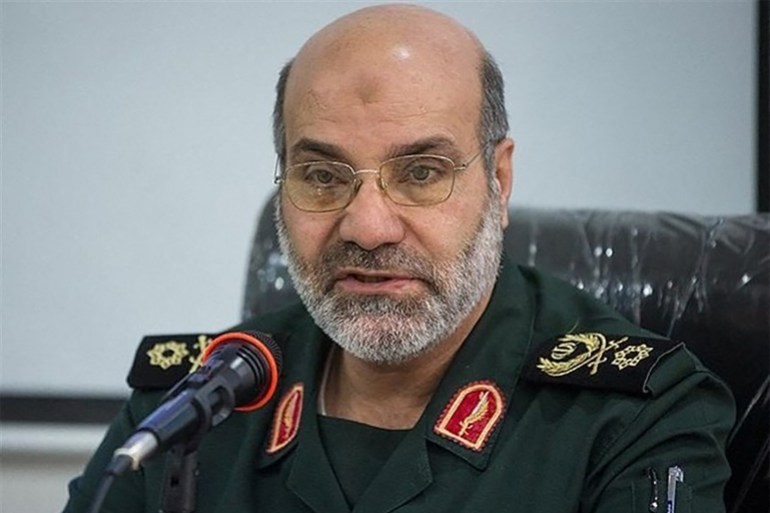ARTICLE AD
Speculation is mounting over how Israel will respond to Iran’s weekend attack, itself a response to Israel’s April 1 strike on the Iranian embassy in Damascus, which killed a top Iranian general and other Islamic Revolutionary Guard Corps officials.
Despite decades-long tensions, direct attacks between the two regional foes had been unheard of. Typically, exchanges are carried out through Iran’s proxy forces in the region or Israeli intelligence operations.
The international community has made repeated statements urging Israel to exercise restraint and not respond to Iran’s retaliation, warning of a spiralling conflict. This approach stands in contrast to the messaging from the West regarding Israel’s assault on Gaza.
Iran’s attack with more than 300 drones and missiles was telegraphed well ahead of time and nearly entirely intercepted by an international array of fighter aircraft and Israel’s Iron Dome defence system.
A direct counterstrike from Israel risks triggering a wider regional war, potentially one drawing in many of the Western powers that have backed Israel.
Responding to pressure from United Kingdom Foreign Secretary David Cameron, Prime Minister Benjamin Netanyahu said Israel makes its own decisions.
But analysts have suggested that the situation may be more nuanced with the Israeli public exerting an almost defining influence upon Netanyahu and his cabinet. The question to be examined is which sector of the Israeli public will have more weight.
The mood in Israel
Israel has devolved the administration of the Gaza war to a three-man cabinet, formed a few days into the conflict and made up of Netanyahu, Defence Minister Yoav Gallant and Netanyahu’s rival Benny Gantz, also a former defence minister.
Both Gallant and Gantz are understood to prefer a more measured response to Iran’s strike, prioritising alliances over revenge. However, any unity within the war cabinet is barely detectable in the wider security cabinet.
There, far-right figures such as National Security Minister Itamar Ben-Gvir – convicted of inciting “terrorism” in 2007 – and Finance Minister Bezalel Smotrich agitate for massive retaliation against Iran despite their lack of experience on the international and military stage.
“Both cabinets have to be attentive to the national mood, given the low level of public trust,” Eyal Lurie-Paredes of the Middle East Institute said.
“In the war cabinet, both Gantz and Gallant have fairly substantial public backing. Netanyahu, who doesn’t, is unlikely to oppose them publicly on this issue.”
“In the security cabinet, right-wing figures such as Smotrich and Ben-Gvir know they have little military credibility, so even though they could publicly advocate for an aggressive response, they are unlikely to use their political capital against the recommendations given by Gantz and Gallant,” Lurie-Paredes added.
 Syrian Foreign Minister Faisal Mekdad, Iran’s Foreign Minister Hossein Amirabdollahian and Iran’s ambassador in Damascus Hossein Akbari stand near Iran’s consulate in Damascus that was hit in a suspected Israeli attack on April 1, in Damascus, Syria April 8, 2024 [Firas Makdesi/Reuters]
Syrian Foreign Minister Faisal Mekdad, Iran’s Foreign Minister Hossein Amirabdollahian and Iran’s ambassador in Damascus Hossein Akbari stand near Iran’s consulate in Damascus that was hit in a suspected Israeli attack on April 1, in Damascus, Syria April 8, 2024 [Firas Makdesi/Reuters]
While thus far Israel has not been shy in attacking enemy territory, hitting targets in Lebanon and Syria among others, there does appear to be apprehension about potential strikes in Iran.
The public mood
A Hebrew University poll this week showed that three-quarters of respondents value Israel’s international and regional alliances above any benefits of striking Iran.
Public support for the war on Gaza also remains strong. Polls by the newspaper Israel Hayom and the Israel Democracy Institute showed broad support for Israel’s war aims with no real drop in the number of those responding to call-ups with Israel’s military reserves.
Despite public support for the war, cynicism over military leaders is increasing as are protests against the government, Netanyahu and Israel’s political direction, especially with an unknown number of captives still held in the Gaza Strip and Netanyahu accused of not working to return them.
“People are tired and increasingly scared,” said Mairav Zonszein, senior analyst at the Crisis Group in Israel.
“They’re distrustful of a political leadership that didn’t see October 7 coming and mistrustful of a military leadership that evidently misjudged the response to the April 1 strike.”
Zonszein added that while there is a wider expectation that there will be a response to Iran’s attack in some form, military analysts and former security officials have urged caution and emphasised the importance of the alliances that supported Israel during Iran’s attack.
“While there has been consensus [in Israel] for the war in Gaza, Iran is another story, and the public is very wary of what that front would look like, and they certainly don’t trust this leadership to take that step,” Zonszein said.
Attitudes
Goodwill towards Israel’s political leaders is at a minimum on both sides of the spectrum.
Israeli settlers have protested against Netanyahu over what they perceive to be his less than full-throated support for their territorial ambitions in the occupied West Bank. The families of the captives accuse him of leaving their relatives in captivity while he wages war against his enemies. Others would like to see the captives sacrificed entirely as they wage “total war” on Gaza, something they suspect Netanyahu from holding back on.
But engaging Iran full-on is a different matter because it would risk Iranian lives as well as threaten an escalation across the region with no potential end.
 People protest against Netanyahu’s government and call for the release of captives taken during the Hamas-led October 7 attacks on southern Israel [Hannah McKay/Reuters]
People protest against Netanyahu’s government and call for the release of captives taken during the Hamas-led October 7 attacks on southern Israel [Hannah McKay/Reuters]
“The US and others have been very clear that’s a red line for them,” analyst Nimrod Flashenberg said from Tel Aviv. “No one can predict exactly what the Israeli cabinet will end up doing, but the wishes of the US and others – especially at this time – are significant restraints.”
As for when Israel’s response will come: “It could be days. It could take weeks,” Lurie-Paredes said. “A waiting period might allow the Israeli government more wiggle room to pursue a broader response.”
So what are Israel’s options and how likely is it to take each one?
Option 1: Retaliation by proxy
Several missiles were launched at Israel by parties considered Iranian proxies, raising the possibility of Israel targeting one to avoid direct confrontation.
Because the proxies are in several countries and have their own alliances, an attack on one may trigger individual responses, which could also spark a regional crisis.
The strongest regional groups allied with Iran are Lebanon’s Hezbollah and Yemen’s Ansar Allah, commonly known as the Houthis.
Hezbollah has confronted Israel previously, most significantly in a 2006 war that badly dented Israel’s military reputation. It has also been engaged in near-daily cross-border attacks with Israel since October 8.
The Houthis have also launched a number of interceptions and attacks on ships they said are Israel-linked as they pass through the Bab al-Mandeb Strait on their way to or from the Suez Canal.
These attacks have had a deep impact on international shipping and trade, eliciting angry warnings from the West to the Houthis.
Option 2: Assassinations
Israel has long been accused of carrying out assassinations of figures it viewed as opponents. According to the Jewish Virtual Library, there have been at least 274 Israeli assassinations since the 1950s although the Israeli secret service, the Mossad, never admits responsibility.
Among many, Saleh al-Arouri, deputy chairman of the Hamas political bureau, was assassinated by drone in Lebanon in January. Within Iran itself, Colonel Hassan Sayyad Khodaei was shot outside his home in May 2022.
Israeli assassinations also reach beyond the region. In 2016, agents believed to belong to Mossad assassinated Tunisian Professor Mohammed al-Zawari in his home city of Sfax.
Israel’s approach to these killings is also reported by Israeli newspaper Haaretz to have resulted in the deaths of several uninvolved individuals.
Option 3: Cyberattacks
Cyberattacks can have a devastating impact on any country in an increasingly digitised and interconnected world.
In the past, cyberattacks have targeted states’ critical infrastructure, such as power grids, hospitals and transportation systems, disrupting operations, costing millions and endangering lives.
 Iranian Brigadier General Mohammad Reza Zahedi of the IRGC’s Quds Force was the most senior commander killed in the attack on Iran’s diplomatic mission in Damascus. Show here in an undated handout from Iran’s Fars news agency on April 2, 2024 [FARS/AFP]
Iranian Brigadier General Mohammad Reza Zahedi of the IRGC’s Quds Force was the most senior commander killed in the attack on Iran’s diplomatic mission in Damascus. Show here in an undated handout from Iran’s Fars news agency on April 2, 2024 [FARS/AFP]
Israel has launched numerous cyberattacks against Iran. In 2010, Stuxnet, an Israeli cyberweapon, was thought to have caused significant damage to Iran’s nuclear programme. More recently, Israeli cyberattacks have hobbled operations at an Iranian port as well as caused significant disruptions at petrol stations across the country.
The Financial Times also reports speculation that Israel may have developed the capacity to cause blackouts across hostile countries.
Option 4: Direct attack
The most confrontational direction Israel could take is to launch its own missiles and drones on Iran, risking civilian casualties and escalating the showdown even further.
Targets within Iran can also vary because Israel’s projectiles could hit innocent civilians or military installations or vital infrastructure.
In this scenario, Western allies’ warnings that they will support Israel only in a defensive action would mean little because Israel would inevitably force Iran to respond, causing a wider regional war.
With the major Western powers entrenched in conflict within the Middle East, the prospects for peace around the world may also be at significant risk.

 8 months ago
42
8 months ago
42 